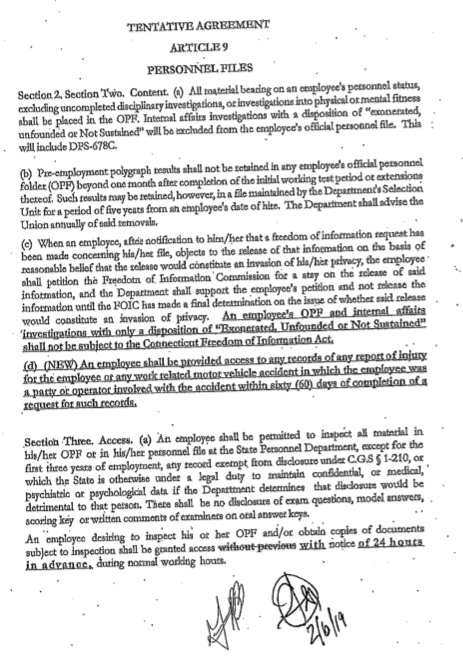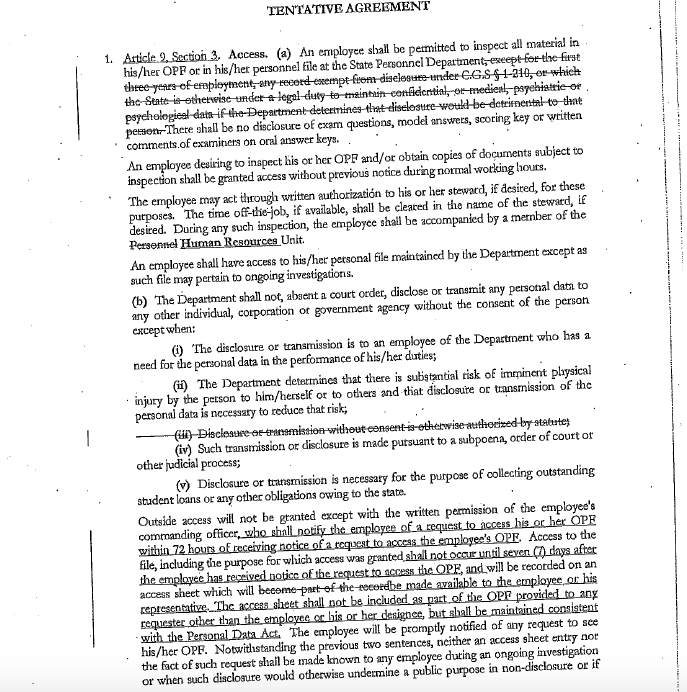A Connecticut State Police contract passed by the legislature in 2019 is being interpreted broadly by the Department of Emergency Services and Public Protection to block freedom of information requests, according to the Connecticut Freedom of Information Commission.
The 2019 contract says a trooper’s personnel file will not be released if the trooper doesn’t consent to the disclosure, unless the FOI Commission makes a final determination as to whether it would constitute an invasion of privacy. Unsustained investigations of a trooper are no longer subject to state FOI laws.
The contract also requires the consent of the officer or their commanding officer in order to release personal data and crossed out the requirement to release that data if the disclosure was required by state statute.
“It was clearly stated on the Senate Floor when the contract was considered that the exemption was narrow and limited to internal investigations with only a disposition of exonerated, unfounded or not sustained,” the CT FOI Commission wrote in public testimony earlier this year. “The Commission has already received several complaints alleging that the Department of Emergency Services and Public Protection is interpreting the new provisions in the NP-1 agreement very broadly and has violated the FOI Act by denying requests for state troopers’ personnel files and internal affairs investigation reports pursuant to such provisions.”
The CT FOI Commission was testifying in support of a bill that would end the ability of union contracts to supersede state freedom of information laws.
Connecticut allows for union contracts to override state law and, in at least two highly-controversial instances, those contract provisions have meant that reporters and the public are blocked from viewing personnel records for state university professors and state police.
The Connecticut State University American Association of University Professors contract came under fire in 2018 after a professor was accused of sexual harassment of students, but reporters were blocked from reviewing the professor’s personnel history.
The bill proposed by Rep. Craig Fishbein, R-Wallingford, and Rep. Mike France, R-Ledyard, received a public hearing before Government Administration and Elections Committee on March 6 before the pandemic shut down the legislative session. It was supported by the Connecticut Freedom of Information Commission, the American Civil Liberties Union of Connecticut and the Connecticut Council on Freedom of Information.
The Commission has already received several complaints alleging that the Department of Emergency Services and Public Protection is interpreting the new provisions in the NP-1 agreement very broadly and has violated the FOI Act by denying requests for state troopers’ personnel files and internal affairs investigation reports pursuant to such provisions.
Testimony of the Connecticut Freedom of Information Commission
The Connecticut Council on Freedom of Information – a group of journalists who support transparency laws – reiterated the criticisms brought the commission.
“Connecticut is the only state in New England – and quite possibly the only state in the country – that allows union contracts to override state open-records law,” wrote Matthew Kauffman, vice-president of CCFOI and investigative journalist for the Hartford Courant. “And that secrecy has come at a grave cost to the integrity of our institutions.”
Kauffman also noted that the DESPP “has taken the position that the language in the current contract actually shuts off access to anything in a personnel file if the trooper doesn’t want the public to know about it.”
The ACLU of Connecticut labeled supersedence a “legal oddity” in its testimony supporting the bill to end contract supersedence of FOI laws.
“The government should not be able to hide employees’ wrongdoing to avoid scandal or liability, but existing legal loopholes allow them to just that,” wrote Kelly McConney Moore, policy counsel for the ACLU-CT.


The union contract protections for college and university professors and state police come amid national social movements like #MeToo and Black Lives Matter that are calling for more accountability for sexual harassment and assault, and for more transparency and accountability by police departments for misconduct.
The Police Accountability and Transparency Task Force released a list of policy recommendations that included examining police union contracts, and there have been discussions of convening a legislative special session in the coming weeks to address police accountability.
Despite being warned about the FOI exemption in the Connecticut State Police contract, the legislature voted to approve the agreement in 2019. Opposition to the contract was split with most Republican some Democratic Party members voting against it.
During debate on the Senate floor, Sen. Gary Winfield, D-New Haven, who pushed for the creation of the Police Accountability and Transparency Task Force, and Senate Republican Leader Len Fasano, R-North Haven, questioned the FOI exemption in the 2019 State Police contract.
Defending the contract, Sen. Catherine Osten, D-Sprague, said the FOI exemption was only limited to unsubstantiated complaints.
Winfield voted in favor of the state police contract. Winfield is also an associate for member services for the Connecticut State University American Association of University Professors, which bars the disclosure of personnel records for state college and university professors.

The supersedence of Connecticut’s FOI laws came to the forefront of state newspapers in 2018 after Central Connecticut State University theater professor Joshua Perlstein was accused of years of sexual misconduct toward female students.
Attempts by the media to gain access to Perlstein’s records were denied under the terms of the collective bargaining agreement. Perlstein resigned before he could be fired and now receives a state pension. One other CCSU professor was terminated following a university investigation.
A 2017 report by the Office of Legislative Research showed that in New England, only Connecticut and Massachusetts allow collective bargaining agreements to supersede state statute, although Massachusetts limits the practice to a set number of statutes.
“The FOI Commission is extremely concerned that there will be increased attempts to circumvent the disclosure provisions of the FOI Act through collective bargaining agreements and arbitration awards and that it will render the FOI Act meaningless,” the commission wrote.


James Hagan
June 24, 2020 @ 9:10 pm
Welcome to CT politics as usual. The Democratic legislature routinely approves union language (ie Deemed Approved) that is counter to common sense, FOI laws, good fiscal policy, taxpayer best interests, and what would be otherwise considered wrong and illegal in a non state businesses.
Kat
June 24, 2020 @ 10:59 pm
Hello, Is this article pertaining.l to the last trooper arrested?
George Tarby
July 22, 2020 @ 10:31 pm
It,s pertaining to corruption at the core of obtaining integrity involving supposed investigations without having to provide the proof of the corruption happening do to failed and in my mind corrupt legislation and or legislators.
George Seymour
October 18, 2020 @ 7:27 pm
George Tardy – 😂
George Tarby
July 22, 2020 @ 10:28 pm
Thank you for listening MATTHEW! JUSTICE IS MY MIDDLE NAME. I GOT MORE WHERE THAT CAME FROM,I HAVE LOTS OF DOCUMENTATION THAT WHAT YOU STATE IS FACT.
Glenn kolata
August 3, 2020 @ 10:06 pm
Just a reflection of our crappy state. Raises and union pensions when residents have little or nothing. I blame democrats who have no concern of costs and the future. No concern at all
George Tarby
January 19, 2021 @ 9:55 pm
If your going to allow commentor s to mock others at least they should be named
George Tarby
January 19, 2021 @ 10:03 pm
What are you so worried about STATE POLICE INTERNAL Affairs in Meriden ??? Because I got you AND that proof you think your laughing at …. I let you win I.A. does not mean I got rid of the evidence of just how corrupt you are in Meriden…Hi fellas!!!